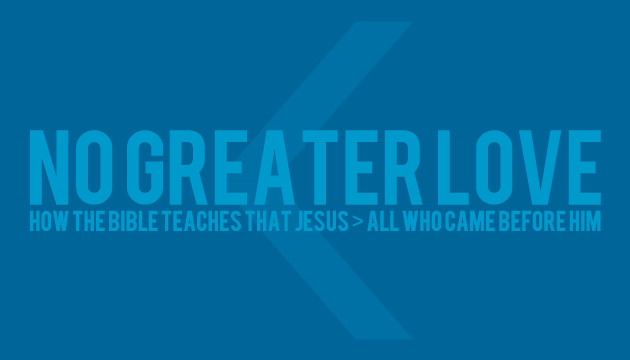This is part 6 of a series exploring how the Bible teaches that Jesus was greater than all who came before him. This series is not intended to be exhaustive. The topic of Jesus as “greater than” or “better” than those who came before him is inexhaustible. Libraries could and should be written on this subject. But we have attempted in these pages to explore what such a rich subject would look like. (Each entry is excerpted from There Is No Greater Love)
Christ Greater than Adam (4 of 6)
And to Adam he (the Lord) said, “Because you have listened to the voice of your wife and have eaten of the tree that I commanded you saying, ‘You shall not eat of it,’ cursed is the ground because of you.
In toil you shall eat of it all the days of your life.
Thorns and thistles it shall bring forth to you. You shall eat of the plants of the field. In the sweat of your brow you shall eat bread till you return to the ground. For out of it you were taken, for you are dust, and to dust you shall return” (Gen 3:17-19).
The Apostle Paul explicitly compares the greater ministry of Jesus, whom he calls “the last Adam,” (1 Cor 15:45) with that of the first Adam. “For as in Adam all die, so also in Christ all shall be made alive”(1 Cor 15:22). Both the first Adam and Jesus, the last Adam, are the heads of humanity. Adam is the head of all who are physically descended from him and subject to death. Jesus, the new Adam, is the head of all who are spiritually descended from Him and are subject to His resurrection promise. “The first man, Adam, became a living soul, but the last Adam became a life-giving spirit” (1 Cor 15:45).
Because of this, Paul calls Adam a “type” of Jesus (Rom 5:14). Adam came forth from the earth. The Lord God breathed into his nostrils the breath of life, and he became a living soul (Gen 2:7). The last Adam, who came from heaven (John 1:1, 14), in His resurrection, also came forth from the earth like the first Adam. Coming forth from the “womb” of the earth emphasized the reality of Christ’s humanity. Yet Jesus breathed upon His disciples so that they might receive the Holy Spirit (John 20:22). Breathing upon His disciples emphasized the divinity of Jesus as a life-giving spirit (1 Cor 15:45).
In Adam we are made in the image of the earth. But in Jesus, our new Adam, we partake of the image of heaven! We have a natural birth in Adam; we have a spiritual birth in the new Adam! We are sown in dishonor in Adam, but in Jesus we are raised in glory! We are weak in our natural body and powerful in our spiritual body. We suffer in the first Adam, but are made glorious in the last Adam (1 Cor 15:40-49).
In all of these descriptions of our humanity, Paul traces the theme of the suffering we know in Adam and the glory we are promised in Christ. Christ suffered that we might have glory. Adam’s disobedience brought forth thorns from the earth; Christ in obedience had His brow crowned with thorns, the emblem of Adam’s disobedience. Adam’s sin brought sweat forth from his brow in order that he might have bread from the earth. Jesus’s brow brought forth sweat like blood in order that we might have the bread of life. If our first creation in Adam was very good (Gen 1:32), our new creation in the last Adam is better!
